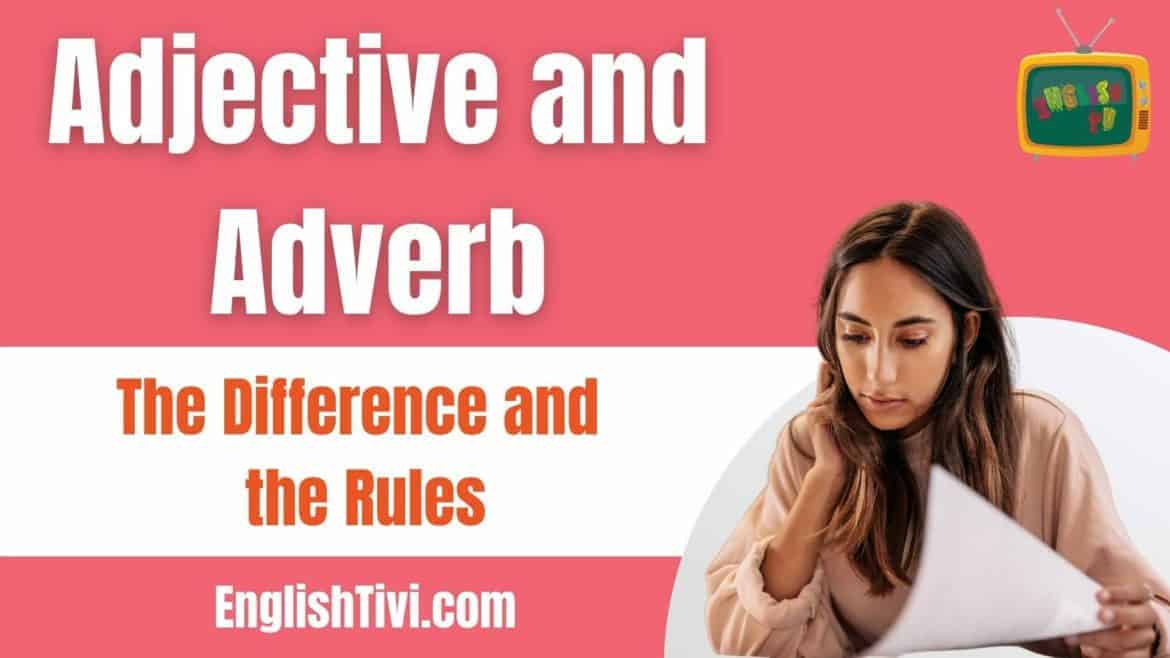To speak correctly and write standard English, you first need to understand the function of each word type in a sentence, including adjective and adverb. In addition, grasping the position and telltale signs between these two words is also very important to perfect your English skills.
⏩ Sign Up to Get Bonus
There are a lot of misconceptions about the words “adjective” and “adverb.” The truth is, their meanings are not always interchangeable. In this lesson, we teach you the difference between these two words and show you how to use them properly.
Learn all about adjectives and adverbs with English tivi right now!
You might also like: ALL the English Grammar Basics You Need
Adjective
An adjective is a word that indicates the nature, extent, range, etc. of a person or thing. It modifies nouns, pronouns, or linking verbs. Adjectives always come before the noun to be modified:
-That is my new red car.
Except for the case that the following two adjectives can come after the noun to be modified: “galore” (many, abundant, abundant) and “general” in the names of major agencies and positions:
-There were errors galore in your final test.
-UN Secretary-General
Adjectives after provocative pronouns (something, anything, anybody…)
-It’s something strange.
-He is somebody quite unknown.
Adjectives are divided into 2 types: descriptive adjectives and limiting adjectives. Descriptive adjectives are adjectives that indicate the color, size, or quality of an object or person. Limiting adjectives are adjectives indicating the quantity, distance, possessive properties, etc. An adjective does not change in person and number of the noun it modifies, except in the case of “these” and “those”.
| DESCRIPTIVE ADJECTIVE | LIMITING ADJECTIVE |
| beautiful large red interesting important colorful | one, two first, second my, your, his this, that, these, those few, many, much |
When a descriptive adjective modifies a singular countable noun, it usually has the article.
a, an or the in front like a pretty girl, an interesting book, the red dress
– Adjectives go before the noun but after the linking verb
If in a phrase there are many adjectives that modify the same noun, the order of the adjectives will be as follows: possessive adjective or article, opinion, size, age, shape, color, origin, material, purpose. Notice that the possessive adjective (my, your, our…) or article (a, an, the) if present, always precede other adjectives. If you have used an article, do not use a possessive adjective and vice versa.
+ A silly young English man
+ The huge round metal bowl
| art/poss | opinion | size | age | shape | color | origin | material | purpose | noun |
| a | silly | Young | English | man | |||||
| the | huge | round | metal | bowl | |||||
| my | small | red | sleeping | bag |
You might also like: Adjective – Parts Of Speech – Adjective English Grammar
Adverb (preposition)
Adverbs (Adverbs) modify a verb, an adjective, or another adverb.
+ Rita drank too much
+ I don’t play tennis very well.
+ John is reading carefully
+ She speaks Spanish fluently
Usually, descriptive adjectives can be changed into adverbs by adding the suffix -ly to the adjective
+ He is a careful driver. He always drives carefully.
| ADJECTIVE | ADVERB |
| bright careful quiet | brightly carefully quietly |
However, there are some adjectives that do not follow the above rules:
• Some special adjectives: good => well; hard => hard; fast => fast; …
-She is a good singer. She sings very well.
• Some adjectives also end in -ly (lovely, friendly…) so to replace adverbs of these adjectives, people use: in a/ an + Adj + way/ manner.
-He is a friendly man. He behaved to me in a friendly way.
The following words are also adverbs: so, very, almost, soon, often, fast, rather, well, there, too. Adverbs are divided into the following six categories:
| ADVERB OF | EXAMPLE | TELL US |
| Manner | happily, bitterly | how something happens |
| Degree | totally, completely | how much something happens, often go with an adjective |
| Frequency | never, often | how often something happens |
| Time | recently, just | when things happen |
| Place | here, there | where things happen |
| Disjunct | hopefully, frankly | viewpoint and comments about things that happen |
Adverbs often act as adverbs in sentences. In addition, prepositional phrases also act as adverbs, they include an opening preposition and the following noun to indicate: address (at home), time (at 5 p.m), vehicle (by train), situation, action. These phrases all function and are used as adverbs, and can also be considered adverbs.
Regarding the order, the adverbs with the same modifiers for a verb usually appear in the order: manner, place, time. In general, adverbs of manner (manner – tell how the action happens) are more closely related to verbs than adverbs of place and adverbs of place. associated with verbs more closely than adverbs of time.
-The old woman is sitting quietly by the fire for hours.
In terms of position, adverbs can appear almost anywhere in a sentence: at the end of a sentence, at the beginning of a sentence, before the main verb, after the auxiliary verb, but also because of that, it is a rather complicated matter. The position of the adverb can change the meaning of the sentence somewhat.
You might also like: Adverb – Parts Of Speech – Adverb English Grammar
Signs to Recognize Adjective and Adverb
Signs to recognize adjectives
- The end is “able”: comparable, comfortable, capable
-We select the hotel because the rooms are comfortable.
- The end is “ible”: responsible, possible, flexible
-She is responsible for her son’s life
- The end is “ous”: dangerous, humorous, notorious
-She is one of the most humorous actresses I’ve ever known.
- The end is “ive”: attractive, decisive, competitive
-She is a very attractive teacher.
- The end is “ent”: confident, dependent, different
-He is confident in getting a good job next week.
- The end is “ful”: careful, harmful, beautiful
-Smoking is extremely harmful to your health.
- The end is “less”: careless, harmless, breathless
-He is fired because of his careless attitude to the monetary issue.
- The end is “ant”: important, reluctant, tolerant
-Unemployment is an important interest of the whole company.
- The end is “ic”: economic, specific, toxic
-Please stick to the specific main point.
- The end is “ly”: friendly, lovely, costly
-Making many copies can be very costly for the company.
- The end is “y”: rainy, sunny, muddy
-Today is the rainiest of the entire month.
- The end is “al”: economical (tiết kiệm), historical, physical
– Instead of driving to work, he has found out a more economical way to save money.
- The end is “ing”: interesting, exciting, moving
-I can’t help crying because of the moving film.
- The end is “ed”: excited, interested, tired
-He has been working so hard today, so he is really exhausted.
Adverb recognition signs
Structural adverbs are quite simple:
| Adv = Adj + -ly |
Eg: wonderfully, beautifully, carelessly…
– She dances extremely beautifully.
See more at: English Grammar
Adjective and Adverb Exercises
Question 1: He answered the phone____________. .
A. sudden
B. suddenly
Question 2: There is a lot of____________interference on the line.
A. noisy
B. noisily
Question 3: Thank you for returning my call so____________. .
A. quick
B. quickly
Question 4: I am calling because the changes seem very____________.
A. importantly
B. important
Question 5: Sorry, but I can’t write that____________.
A. fast
B. fastly
Question 6: She sounded very____________ on the phone
A. angrily
B. angry
Question 7: The boy skipped____________ down the road to school.
A. happy
B. happily
Question 8: It was____________packaged and wrapped in pretty, recycled paper.
A. nicely
B. nice
Question 9: All goes____________, and he feels relaxed enough to go for a walk.
A. good
B. well
Question 10: Andy doesn’t often work____________. .
A. hardly
B. hard
Question 11: She planned their trip to Greece very____________. .
A. carefully
B. careful
Question 12: She speaks very____________. .
A. quietly
B. quiet
Question 13: Turn the stereo down. It’s too____________. .
A. loudly
B. loud
Question 14: Children should be cared for by a____________ family.
A. normally
B. normal
Question 15: Jane is____________because her job is____________. .
A. bored-bored
B. boring-boring
C. boring-bored
D. bored-boring
Question 16: Mai has lived in London for five years so she speaks____________. .
A. perfect English
B. perfectly English
C. English perfect
D. English more perfect
Question 17: Mr. Davis doesn’t work here____________. He left about 6 months ago.
A. any long
B. some long
C. any longest
D. any longer
Question 18: We didn’t go out because it was raining____________. .
A. heavy
B. heavily
C. heavier
D. heavilier
Question 19: The driver of the car was____________in the accident.
A. serious injured
B. seriously injured
C. serious injuredly
Question 20: I don’t like this coffee because it tastes very____________. .
A. strength
B. strong
C. strongly
D. strengthly
Adjective and Adverb Answer
1: B. suddenly
2: A. noisy
3: B. quickly
4: B. important
5: A. fast
6: B. angry
7: B. happily
8: A. nicely
9: B. well
10: B. hard
11: A. carefully
12: A. quitely
13: B. loud
14: B. normal
15: D. bored-boring
16: B. perfectly English
17: D. any longer
18: B. heavily
19: B. seriously injured
20: B. strong
You might also like: What are the 4 Types of Questions in English?
Subscribe to the English tivi channel on Youtube to improve your English learning skills!





